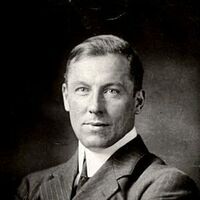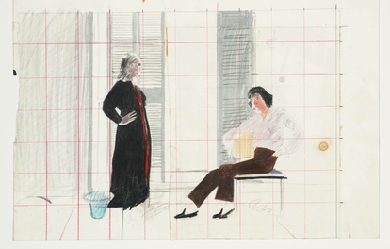The Absinthe Drinkers
He’s yonder, on the terrace of the Cafe de la Paix,
The little wizened Spanish man, I see him every day.
He’s sitting with his Pernod on his customary chair;
He’s staring at the passers with his customary stare.
He never takes his piercing eyes from off that moving throng,
That current cosmopolitan meandering along:
Dark diplomats from Martinique, pale Rastas from Peru,
An Englishman from Bloomsbury, a Yank from Kalamazoo;
A poet from Montmartre’s heights, a dapper little Jap,
Exotic citizens of all the countries on the map;
A tourist horde from every land that’s underneath the sun —
That little wizened Spanish man, he misses never one.
Oh, foul or fair he’s always there, and many a drink he buys,
And there’s a fire of red desire within his hollow eyes.
And sipping of my Pernod, and a—knowing what I know,
Sometimes I want to shriek aloud and give away the show.
I’ve lost my nerve; he’s haunting me; he’s like a beast of prey,
That Spanish man that’s watching at the Cafe de la Paix.
Say! Listen and I’ll tell you all . . . the day was growing dim,
And I was with my Pernod at the table next to him;
And he was sitting soberly as if he were asleep,
When suddenly he seemed to tense, like tiger for a leap.
And then he swung around to me, his hand went to his hip,
My heart was beating like a gong —my arm was in his grip;
His eyes were glaring into mine; aye, though I shrank with fear,
His fetid breath was on my face, his voice was in my ear:
“Excuse my brusquerie,” he hissed; “but, sir, do you suppose —
That portly man who passed us had a wen upon his nose?”
And then at last it dawned on me, the fellow must be mad;
And when I soothingly replied: “I do not think he had,”
The little wizened Spanish man subsided in his chair,
And shrouded in his raven cloak resumed his owlish stare.
But when I tried to slip away he turned and glared at me,
And oh, that fishlike face of his was sinister to see:
“Forgive me if I startled you; of course you think I’m queer;
No doubt you wonder who I am, so solitary here;
You question why the passers—by I piercingly review . . .
Well, listen, my bibacious friend, I’ll tell my tale to you.
”It happened twenty years ago, and in another land:
A maiden young and beautiful, two suitors for her hand.
My rival was the lucky one; I vowed I would repay;
Revenge has mellowed in my heart, it’s rotten ripe to—day.
My happy rival skipped away, vamoosed, he left no trace;
And so I’m waiting, waiting here to meet him face to face;
For has it not been ever said that all the world one day
Will pass in pilgrimage before the Cafe de la Paix?"
“But, sir,” I made remonstrance, “if it’s twenty years ago,
You’d scarcely recognize him now, he must have altered so.”
The little wizened Spanish man he laughed a hideous laugh,
And from his cloak he quickly drew a faded photograph.
“You’re right,” said he, “but there are traits (oh, this you must allow)
That never change; Lopez was fat, he must be fatter now.
His paunch is senatorial, he cannot see his toes,
I’m sure of it; and then, behold! that wen upon his nose.
I’m looking for a man like that. I’ll wait and wait until . . .”
“What will you do?” I sharply cried; he answered me: “Why, kill!
He robbed me of my happiness —nay, stranger, do not start;
I’ll firmly and politely put —a bullet in his heart.”
And then that little Spanish man, with big cigar alight,
Uprose and shook my trembling hand and vanished in the night.
And I went home and thought of him and had a dreadful dream
Of portly men with each a wen, and woke up with a scream.
And sure enough, next morning, as I prowled the Boulevard,
A portly man with wenny nose roamed into my regard;
Then like a flash I ran to him and clutched him by the arm:
“Oh, sir,” said I, “I do not wish to see you come to harm;
But if your life you value aught, I beg, entreat and pray —
Don’t pass before the terrace of the Cafe de la Paix.”
That portly man he looked at me with such a startled air,
Then bolted like a rabbit down the rue Michaudière.
“Ha! ha! I’ve saved a life,” I thought; and laughed in my relief,
And straightway joined the Spanish man o’er his apéritif.
And thus each day I dodged about and kept the strictest guard
For portly men with each a wen upon the Boulevard.
And then I hailed my Spanish pal, and sitting in the sun,
We ordered many Pernods and we drank them every one.
And sternly he would stare and stare until my hand would shake,
And grimly he would glare and glare until my heart would quake.
And I would say: “Alphonso, lad, I must expostulate;
Why keep alive for twenty years the furnace of your hate?
Perhaps his wedded life was hell; and you, at least, are free . . .”
“That’s where you’ve got it wrong,” he snarled; “the fool she took was me.
My rival sneaked, threw up the sponge, betrayed himself a churl:
'Twas he who got the happiness, I only got —the girl.”
With that he looked so devil—like he made me creep and shrink,
And there was nothing else to do but buy another drink.
Now yonder like a blot of ink he sits across the way,
Upon the smiling terrace of the Cafe de la Paix;
That little wizened Spanish man, his face is ghastly white,
His eyes are staring, staring like a tiger’s in the night.
I know within his evil heart the fires of hate are fanned,
I know his automatic’s ready waiting to his hand.
I know a tragedy is near. I dread, I have no peace . . .
Oh, don’t you think I ought to go and call upon the police?
Look there . . . he’s rising up . . . my God!
He leaps from out his place . . .
Yon millionaire from Argentine . . . the two are face to face . . .
A shot! A shriek! A heavy fall! A huddled heap! Oh, see
The little wizened Spanish man is dancing in his glee. . . .
I’m sick . . . I’m faint . . . I’m going mad. . . .
Oh, please take me away . . .
There’s BLOOD upon the terrace of the Cafe de la Paix. . . .






